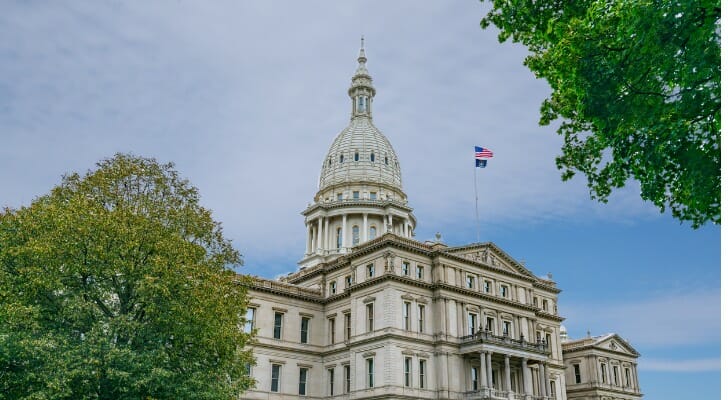 Michigan has been one of the hardest-hit states in the COVID-19 crisis, with only New York and New Jersey seeing more cases and deaths. This infection rate has also led to significant economic instability in the state. Fortunately, the Wolverine State has programs to help affected individuals and small businesses, and its governor has issued a series of directives to facilitate benefits for the needy. And the federal government has also established programs that residents can take advantage of, including the CARES Act stimulus bill and the Paycheck Protection Program that the bill created. Here is an overview of the help that’s available.
Michigan has been one of the hardest-hit states in the COVID-19 crisis, with only New York and New Jersey seeing more cases and deaths. This infection rate has also led to significant economic instability in the state. Fortunately, the Wolverine State has programs to help affected individuals and small businesses, and its governor has issued a series of directives to facilitate benefits for the needy. And the federal government has also established programs that residents can take advantage of, including the CARES Act stimulus bill and the Paycheck Protection Program that the bill created. Here is an overview of the help that’s available.
Michigan Coronavirus Relief for Individuals
As of April 20, Michigan had 32,000 confirmed COVID-19 cases and 2,468 deaths. The state is also being hammered economically. It is expected to see a sharp decline in GDP this year, with decreases in state revenue through 2022. More than 2 million Michigan workers are expected to lose at least two days’ wages. A recent statewide poll from the Detroit Regional Chamber found that 29 percent of respondents have been furloughed, laid off or unable to work. And among respondents who were working prior to the virus, 27.3 percent have been forced to file for unemployment.
To deal with this economic turmoil, several state programs have received additional funding or had eligibility standards eased.
Unemployment Benefits
The state of Michigan has made more people eligible for unemployment benefits than before the pandemic. New regulations allow benefits for people who cannot work due to family responsibilities; those who are quarantined; and first responders who have become sick due to exposure to COVID-19. Beyond that, most people who were previously working full-time and even those who have been reduced to part-time work are now eligible for unemployment.
Michigan residents can apply for unemployment benefits here. You must apply within 28 days of becoming unemployed to qualify for this assistance.
Health Insurance, Food, and Other Assistance
The Michigan Bridges program, which had fully rolled out across the state by April 2018, provides child development and care (CDC), food assistance (FAP), healthcare coverage, state emergency relief such as housing and utility assistance (SER), and cash assistance when needed. Michigan residents can apply for this program assistance here.
State Administration Action
Gov. Gretchen Whitmer has signed signed two supplemental budget bills that provide an additional $150 million in state funding to fight COVID-19. She also has declared a state emergency, restricted visits to hospitals and other facilities, closed all schools, prohibited gatherings of more than 50 people, closed public spaces such as theaters, gyms, bars, and casinos, and limited restaurants to carry-out and delivery orders. Most recently, she’s also issued a stay-home order. She also suspended any evictions of renters due to non-payment.
Michigan Coronavirus Relief for Small Businesses

For local businesses and businesses that are Michigan-headquartered, the state has strengthened several resources. The Michigan Economic Development Corporation has a website that is updated as often as new information comes available for businesses. Here are a few of the most prominent programs designed to help small businesses in Michigan.
Michigan Small Business Relief Program
In response to the coronavirus, the state launched the Michigan Small Business Relief Grants program. It is being administered by 15 local and nonprofit economic development organizations (EDOs) around Michigan. Applications are already closed, but all 15 organizations are designed to help businesses of specific size or location. Keep an eye on these organizations to monitor any reopening of applications or additional assistance that may be available in your area.
Additional Existing Programs
The PMBC Virtual Procurement Assistance program is helping to source health and human service supplies during COVID-19. If you need personal protective equipment (PPE), you can apply for assistance here.
The Michigan Strategic Fund (MSF) awardee relief initiative authorizes emergency relief to businesses and community projects that have already received grants, loans, or other economic assistance from the MSF. MSF economic assistance recipients can view their updated parameters here.
The Northern Initiatives Program is providing up to $2 million in loans to Northern initiatives in increments of $5,000 to $250,000. The program focuses specifically on supporting women- and minority-owned businesses. Applications are currently on hold but will reopen mid-May. Interested applicants can get more information here.
Federal Coronavirus Relief for Individuals
In response to coronavirus, the federal government has created several programs to help individuals financially during the economic decline. The most prominent action taken by the government is the Coronavirus Stimulus Package known as the CARES Act. For individuals, the centerpiece of this bill was the economic impact payments. If you earned under $100,000 in 2018 or 2019 and have filed your taxes, you will receive a stimulus check of up to $1,200 per month. The amount available increases for married couples and people with kids, so you can use this calculator to figure out exactly how much you will get from the stimulus package.
The federal Pandemic Unemployment Compensation (PUC) program, another CARES Act initiative, provides an extra $600 per week to regular unemployment insurance and Pandemic Unemployment Assistance (PUA) recipients. Further, Pandemic Emergency Unemployment Compensation (PEUC), which is also part of the CARES Act, allows individuals to receive an additional 13 weeks of unemployment benefits after they have exhausted their state benefits. Finally, the U.S. Department of Labor outlines new expansions and flexibility to their unemployment guidelines on their website.
In addition, the CARES Act supports student loan relief, tax-free student loan repayment benefits, tax deadline extensions, and more. More information regarding rent and mortgage relief is available here. You can view all of the individual federal relief programs here.
Additionally, Fannie Mae and Freddie Mac have offered relief to residents who are unable to make their mortgage payments due to a decline in income and have suspended foreclosure sales and evictions for 60 days.
Federal Coronavirus Relief for Small Businesses
 The federal government launched several programs available to aid small businesses. The most prominent is the Paycheck Protection Program. With this assistance program, small businesses can borrow up to 2.5 times their payroll (minus salaries of $100,000 or more), with a maximum loan of $10 million. These loans are 100% guaranteed by the Small Business Administration (SBA). The equivalent of eight weeks of payroll, mortgage interest, rent, and utilities will be forgiven from the loan. Small businesses can apply for this loan through a local lender.
The federal government launched several programs available to aid small businesses. The most prominent is the Paycheck Protection Program. With this assistance program, small businesses can borrow up to 2.5 times their payroll (minus salaries of $100,000 or more), with a maximum loan of $10 million. These loans are 100% guaranteed by the Small Business Administration (SBA). The equivalent of eight weeks of payroll, mortgage interest, rent, and utilities will be forgiven from the loan. Small businesses can apply for this loan through a local lender.
The other major federal program for small business assistance is the Economic Injury Disaster Loans. These loans, also available through the SBA, are available for up to $2 million in areas where an economic disaster has been declared. The interest rate is 3.75% for businesses and 2.75% for nonprofits. Businesses can take out these loans with up to 30-year terms and can apply here.
Additionally, businesses can apply for the Express Bridge Loan Pilot Program. To qualify for this loan, small businesses must have been in operation when the virus was declared an emergency and meet all other SBA 7(a) loan requirements.
The Main Street Lending Program is not connected to the SBA. Instead, it is run by the Federal Reserve. The MSLP is designed to help banks give money to businesses in need of money during COVID-19. Businesses with fewer than 10,000 employees are encouraged to apply. Small businesses can apply for both this program and other assistance from the SBA.
Finally, the CARES Act has allowed businesses to postpone their payroll taxes through the end of 2022. They can earn an Employee Retention Tax Credit (ERTC). This will help them keep their employees on payroll during the economic downturn.
The Bottom Line
Every state is making accommodations for individuals and businesses in their state. Michigan has several programs designed to keep its citizens safe and to help mitigate further financial disaster. Be sure to use the links above to help you decide which programs are best for you to pursue.
Tips for Managing Your Finances in the Pandemic
- A financial advisor can build you a financial plan that keeps you on track even when the economy is struggling. Finding the right financial advisor who fits your needs doesn’t have to be hard. SmartAsset’s free tool matches you with financial advisors in your area in five minutes. If you’re ready to be matched with local advisors who will help you achieve your financial goals, get started now.
- It is crucial to stay up to date with both SBA and state provisions so that you can take advantage of these programs if your business loses revenue due to COVID-19. Several companies are also supporting coronavirus-impacted people, and banks are also taking steps to help their customers. For a comprehensive list of the programs available to small businesses, check out our guide to coronavirus relief for small businesses.
Photo credit: ©iStock.com/pabradyphoto, ©iStock.com/RiverNorthPhotography, ©iStock.com/Sean Pavone